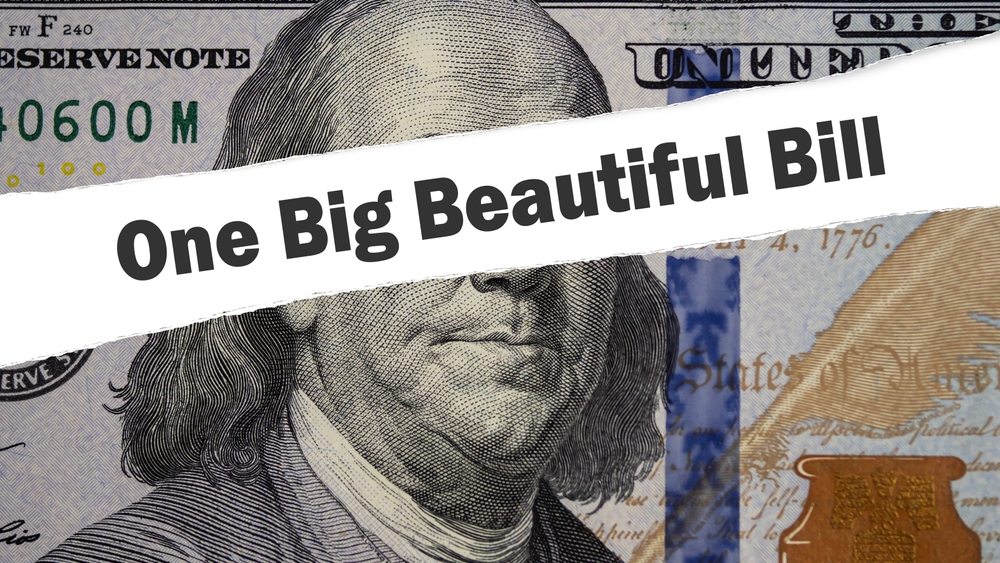
We’re kicking off our new blog series with an overview of the One Big Beautiful Bill Act (“OBBBA”), a major piece of legislation that’s reshaping the tax landscape for both individuals and businesses. Passed through a streamlined process that allowed for swift approval, the OBBBA brings a host of changes that will impact financial planning for years to come.
Long-term Stability for Taxpayers
A central feature of the OBBBA is its move to lock in many of the tax reductions that were set to lapse at the end of 2025. By extending these provisions indefinitely, the law gives families and companies a clearer picture of their tax obligations, making it easier to plan for the future.
Encouraging Investment and Work
The new law also makes permanent several incentives designed to spur economic growth. Businesses can now continue to immediately deduct the full cost of certain investments and research activities, removing uncertainty and encouraging expansion. For individuals, the OBBBA introduces temporary tax breaks for specific types of income, such as extra pay and gratuities, as well as for seniors and those with auto loans, though these benefits are only available for a limited period.
Navigating a Patchwork of Rules and Regulations
While the OBBBA provides lasting certainty in some areas, it also introduces a mix of temporary and permanent rules. Some deductions and credits will phase out or change in the coming years, requiring taxpayers to stay alert to shifting requirements. For example, certain limits on deductions for state and local taxes will tighten again in the future, and enhanced deductions for business property will eventually expire for new projects.
Balancing Simplicity and Complexity
On the positive side, the law’s permanent changes offer predictability and support for long-term growth. On the negative side, the addition of new, short-term tax breaks and more detailed rules adds layers of complexity, making it more challenging for taxpayers to keep up.
Specific Change – State and Local Tax (SALT) Deductions
Under the new rules, married couples filing jointly can now (temporarily) deduct up to $40,000 in state and local taxes, a significant increase from the previous $10,000 cap. However, this higher deduction is only available to those whose modified adjusted gross income (“MAGI”) does not exceed a set threshold.
For joint filers, the full $40,000 deduction is available up to a MAGI of $500,000. Once income surpasses this threshold, the deduction begins to phase out, and for those with a MAGI of $600,000 or more, the cap drops back to $10,000. The same structure applies to married couples filing separately, but at half the income levels. These limits are tied to your filing status and only apply if you itemize deductions.
Additionally, the income thresholds for the deduction increase by 1% each year through 2029. After that, the SALT deduction is permanently reduced to $10,000 for joint filers and $5,000 for those filing separately.
Visual Comparison (2024 vs. 2025)
Below is an example that depicts (all things equal) how a married couple may enjoy immediate tax benefits from the changes to the SALT deduction. This example assumes that the taxpayers paid $20,000 in state/local taxes in 2024 and 2025.

Visual Comparison (2025 – Phaseout)
Below is an example that depicts (all things equal) how a married couple may lose the tax benefits from the changes to the SALT deduction. This example assumes that the taxpayers paid $40,000 in state/local taxes in 2025, but the total earnings/income are different—$500,000 and $600,000, respectively.

Conclusion
Montgomery Legal is here to help you understand how the OBBBA could affect your tax situation and what steps you can take to make the most of the new rules. If you have questions about how these updates might impact your taxes, finances, business, Montgomery Legal is here to help you navigate the evolving tax environment.
Contact Montgomery Legal today to discuss your estate planning needs. Schedule a Consultation or call (214) 432-6100.
Explore these related articles to gain further insights on your chosen topic.


Schedule a consultation today or give us a call to start your journey.
